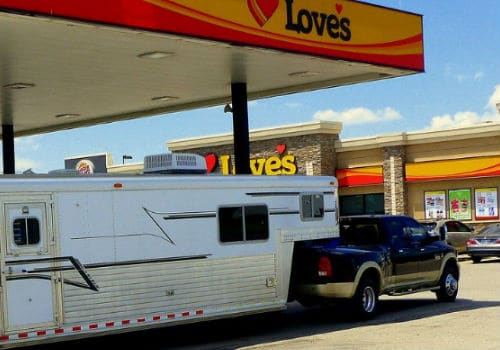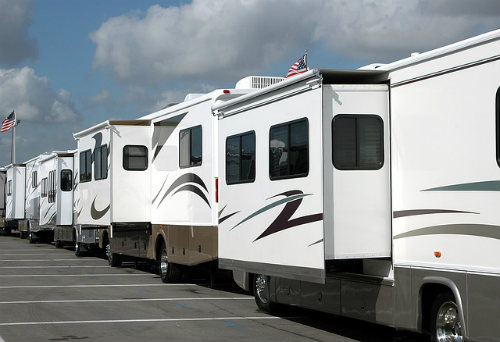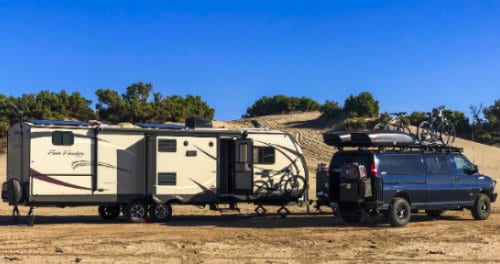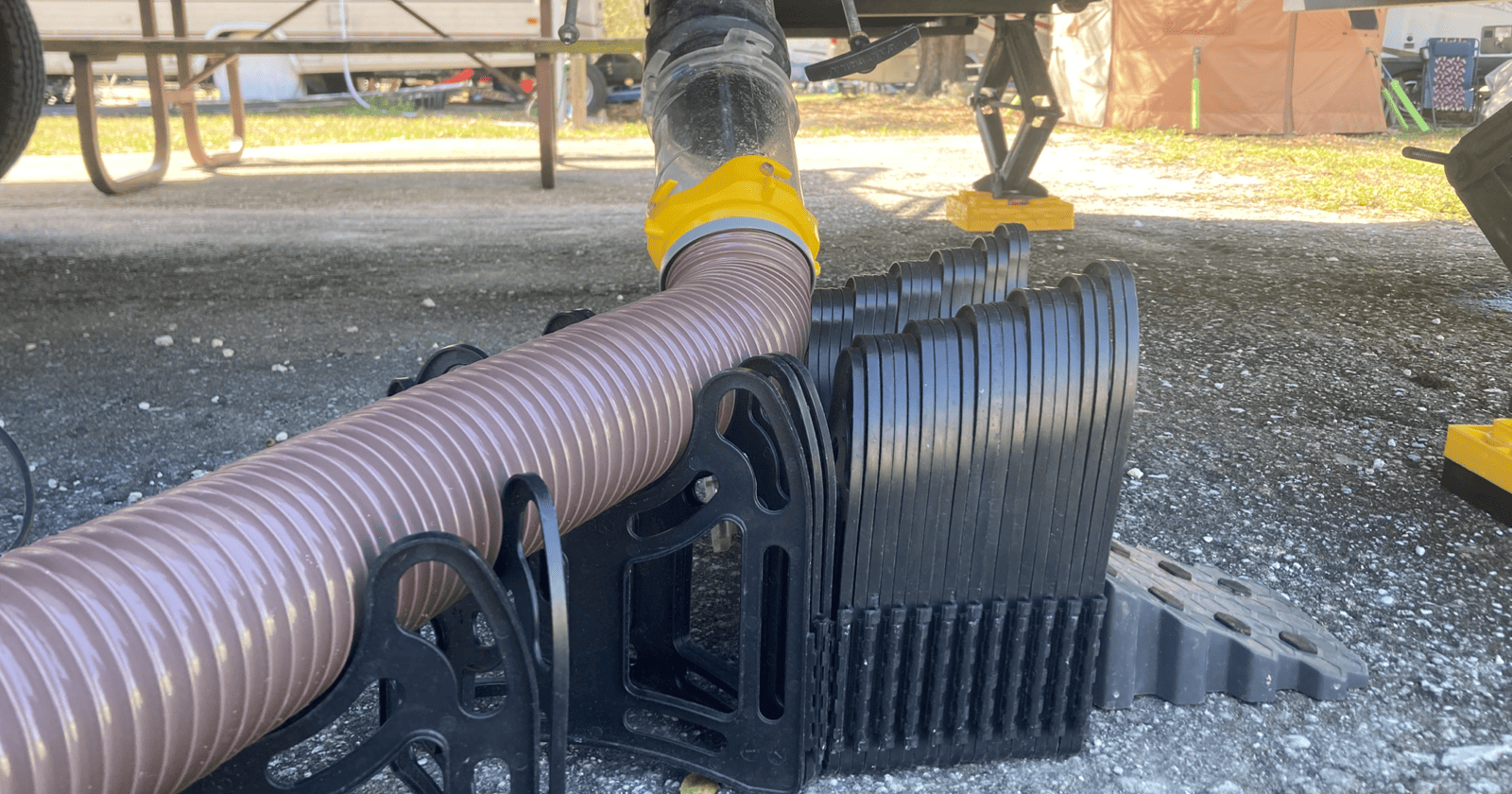When you’re shopping for a camper, the weight is going to be an incredibly important factor in deciding which one is the right one for you and your family. Assuming that you don’t want to buy a new truck to tow your camper with, it will have to weigh in the range that your current vehicle can pull. On average, a camper is going to weigh approximately 5,000 pounds empty, and closer to 7,000 pounds when filled with water, your gear, and amenities.
Of course, many factors will affect the weight of your camper, and this is just an average ballpark number. Because it is incredibly unsafe – for both physical and legal reasons – to try towing a camper that your truck should not be towing, you’ll want to do your research before committing to anything. I’ve compiled some of that research for you here to make understanding this process a little easier.
What the Numbers Mean

As you begin looking at different campers to try and make your decision, you may notice that there are multiple weights listed under their specifications. Understanding what each of these numbers
- ”Dry Weight” or “Unloaded Vehicle Weight” – This number is the camper weight when it is completely empty. It does not account for filled water or fuel tanks or any gear loading the camper down.
- ”Curb Weight” – This number is similar to unloaded vehicle weight, with some variance. This weight may include a full tank of fuel, oil, washer fluid, etc. Some companies, particularly those based in Europe, may add 150-200 pounds of weight to account for one passenger.
- ”Hitch Weight,” “Tongue Weight,” or “Pin Weight” – Although there are three separate terms, all of these numbers refer to the same thing. Hitch weight, tongue weight and pin weight will all give you the weight applied to your hitch when the (unloaded) camper is hooked up to it.
- ”Cargo Carrying Capacity” or “Net Carrying Capacity” – This number refers to the weight of gear and other items that you can safely store in your camper.
- ”Gross Vehicle Weight” – When you combine the unloaded vehicle weight with the cargo carrying capacity, and account for things such as full tanks of water, fuel, etc, this is the number you end up with. The gross vehicle weight is the maximum camper weight that this particular camper should ever have.
Now that you understand what each of these numbers means, make sure you’re looking at the gross vehicle weight when determining whether or not your truck will be capable of towing a particular camper.
Factors that Affect Camper Weight
Many different factors can and will affect how much your camper will weigh. Understanding what these factors are will help you look for the right style and features when shopping.
#1 – Material Matters
The first factor that affects the weight of a camper is the material they are made from. Campers are generally either constructed from aluminum or fiberglass. Both options have their own pros and cons.
Aluminum is the cheaper option, which may make it preferable to someone on a tighter budget. Aluminum is easier to damage than fiberglass, but it’s also much easier to replace if it’s damaged. However, when it comes to weight, an aluminum camper will weigh more than a fiberglass camper. This is because aluminum campers have wooden frames, which add a significant amount of weight.
Fiberglass campers are more expensive to purchase and to repair if damage should occur. However, the frame is generally made from aluminum piping instead of wood, which makes them lighter than their counterparts. Fiberglass campers are also known to have better resale value because they are harder than aluminum.
#2 – Pop-Out or Slide-Out?

Additionally, most campers will either come with pop-outs or slide-outs. Both pop-outs and slide-outs are designed to create extra room within the camper when you are parked at your destination. But they have dramatic differences in weight.
A pop-out will add next to no weight to the camper. This is because pop-outs are made from canvas tent material. It is incredibly light.
On the other hand, slide-outs will typically add over 700 pounds of weight to the camper. Generally, slide-outs are considered the superior option because they are more durable. Whether or not they are worth the extra weight will vary from person to person.
#3 – What You Bring Can Drastically Affect Weight
What you intend to bring with you will also affect the weight of the camper. You’ll need to look at each camper’s cargo carrying capacity and try to calculate how much you and your family will need to travel within comfortably.
Weight adds up fast when you begin looking at all the things you intend to fill your camper with. Additionally, the more people you bring, the more weight you’re going to add. It would likely not be a good idea for a family of five to travel in a camper with only a 400-pound carrying capacity, for example.
How Much Does a Pop-Up Camper Weigh?
Now that we’ve identified a general estimate for the average camper weight, is there a difference in weight if we dive deeper and only assess the weights of pop-up campers?
In short, the answer is yes. Of the 11 pop-up campers I reviewed, the average weight of a pop-up camper was approximately 3,600 pounds.
Like its counterparts, pop-up campers vary significantly in weight (e.g. tent vs. hard-sided style, the model and size of the camper itself, and of course any pre-installed amenities).
How Much Does a Camper Weigh: Examples of Popular Campers’ Weights

How much does a camper weigh? The average camper weighs approximately 7,000 pounds when loaded down; however, that’s just an average number and does not account for all of the possible fluctuations caused by the above factors. Below, I’ve gathered a list of some of the most popular campers and their specifications to give you a better idea of how broad the spectrum of camper weights can be.
Travel Trailer: Sportsman S330IK by KZ-RV
Unloaded Vehicle Weight – 7,690 pounds
Cargo Carrying Capacity – 1,110 pounds
Gross Vehicle Weight – 8,800 pounds
5th Wheel: Talon 313T by Jayco
Unloaded Vehicle Weight – 10,815 pounds
Cargo Carrying Capacity – 5,185 pounds
Gross Vehicle Weight – 16,000 pounds
Pop-Up Camper: Mantis Trek by Taxa Outdoors
Unloaded Vehicle Weight – 3,020 pounds
Cargo Carrying Capacity – 780 pounds
Gross Vehicle Weight – 3,800 pounds
Truck Camper: 650 Truck Camper by Lance Camper
Unloaded Vehicle Weight – 1,700 pounds
Cargo Carrying Capacity – 200 pounds
Gross Vehicle Weight – 1,900 pounds
Travel Trailer: Gulf Breeze 295DC by Gulf Stream Coach
Unloaded Vehicle Weight – 7,323 pounds
Cargo Carrying Capacity – 2,437 pounds
Gross Vehicle Weight – 9,760 pounds
Small Travel Trailer: Nest 16U Dinette by Airstream
Unloaded Vehicle Weight – 3,400 pounds
Cargo Carrying Capacity – 600 pounds
Gross Vehicle Weight – 4,000 pounds
Teardrop Trailer: Luna by inTech RV
Unloaded Vehicle Weight – 1,700 pounds
Cargo Carrying Capacity – 300 pounds
Gross Vehicle Weight – 2,000 pounds
5th Wheel: Elite Suite 38 RSSA by DRV Suites
Unloaded Vehicle Weight – 17,100 pounds
Cargo Carrying Capacity – 4,900 pounds
Gross Vehicle Weight – 22,000 pounds
5th Wheel: Solitude 300GK by Grand Design
Unloaded Vehicle Weight – 12,100 pounds
Cargo Carrying Capacity – 2,900 pounds
Gross Vehicle Weight – 15,000 pounds
5th Wheel: Cougar X-Lite 25RES by Keystone
Unloaded Vehicle Weight – 7,035 pounds
Cargo Carrying Capacity – 2,965 pounds
Gross Vehicle Weight – 10,000 pounds
Choosing the Best Camper For You
Unless you’re planning to purchase a new towing vehicle to go along with your new camper, you’ll need to figure out how much your truck can tow and stick to that. Make sure that you do not purchase a camper that will exceed your truck’s maximum towing capacity. There are several reasons this is important to keep in mind.
Firstly, there are many places in the United States where you’ll be required to stop at weigh stations. If a police officer stops you and discovers you’re towing more than you’re legally allowed to, you could be looking at a ticket with a large fine. It isn’t worth the risk.
Additionally, you should keep in mind that just because your tow vehicle is capable of towing a very heavy camper does not mean that it will be capable of towing it well. Ideally, you should not try and max out the maximum tow capacity on your truck. Maxing the weight out is bad for the brakes, the tongue, and the transmission on your truck in the long run.
For additional information on this subject, check out this Youtube video from an experienced traveler who explains how much you can really tow with the truck you’ve got.
If you are planning to purchase a new towing vehicle to go along with your new camper, the same rules apply. But in this scenario, you’ll have a little more leeway to get the camper you want because you can choose your truck specifically for its towing capacity.
It is also important to keep in mind that even if your vehicle is capable of towing one of the larger campers, this is going to cost you. Not only in the sense that purchasing a larger camper will be more expensive, but also because it will have a direct impact on your gas mileage. If you intend to drive your camper on long distances and want to keep the fuel budget as low as possible, consider purchasing a camper that is on the smaller side.
You’ll want to make sure you’re looking for a camper that’s capable of carrying you, your family, and all of your supplies, while still being safe to tow and within your budget. Finding this middle ground will be an incredibly important part of selecting the best camper for you.




